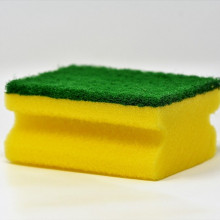Should I be microwaving my kitchen sponges?
Listener Patrick got in touch with this question - "Can I keep using my kitchen sponges and cloths till they fall apart as long as I microwave them occasionally. And is it better to sterilise them using the microwave or should I be putting them in the dishwasher?"
Microwaving sponges would save a lot of them from being used and thrown away wouldn’t it? Especially since plastic sponges take at least 500 years to decompose in landfill. Luckily I knew Alice Taylor, a friendly biochemist, and we tested this at home.. We also asked expert Markus Egert, from Furtwangen University in Germany to share the results of his complete experiments.
In this episode

QotW: Should I microwave sponges?
We asked Alice Taylor, a friendly biochemist, and we tested this at home. We also reached out to microbiologist Markus Egert, from Furtwangen University in Germany to share the results of his experiments around microwaving sponges...
Mel - Microwaving sponges would save a lot of them from being used and thrown away wouldn’t it? Especially since plastic sponges take at least 500 years to decompose in landfill. Luckily I knew Alice Taylor, a friendly biochemist, and we tested this at home..
Alice - We decided to do a very simple experiment using Agar plates, containing all the nutrients bacteria could ask for. We took the in-use kitchen sponge and very quickly dabbed the sponge onto the agar plate. We then popped the sponge in the microwave for about a minute.
Mel - the sponge started to make some smoke in the microwave, so we quickly took it out as the fat on the sponge might catch fire.
Alice - Now we can dab the very hot microwaved sponge onto another agar plate. We then put these plates in a warm place for around 36 hours.
Mel - So Alice, is there a difference between the two plates?
Alice - Lots of bacteria grew on the agar plate that have been in contact with the non microwaved sponge which is a tad alarming. However, on the plate that has seen the microwaved sponge there is next to no bacterial growth. It seems that microwaving a kitchen sponge is an effective way to kill the bacteria.
Mel - Markus Egert, a microbiologist in Furtwangen University in Germany took our experiment to the next level and found that cleaning sponges can have some unintended consequences.
Markus - Microwaving indeed significantly reduces the number of germs inside a kitchen sponge. Dishwashing might even work better due to the use of dishwashing detergents in addition to elevated temperatures. However, putting them into the washing machine at a temperature of at least 60 degrees centigrade and using a bleach containing heavy duty detergent is probably the best way to sanitise kitchen sponges and cloths
Mel - The problem is, the long-term effects of regular microwaving (or any other cleaning method) on the microbial community of a kitchen sponge or cloth are largely unknown.
Markus - Our research suggests that long term cleaning might select for potentially pathogenic and/or smelly bacteria. We think this is because some bacteria can adapt to the cleaning process, survive the microwave or dishwasher, and can easily grow to higher numbers again. This is a classical selection process, very well known from biological systems.
Alice - Bacteria also proliferates in wet environments, so keeping your sponge dry is a good way of preventing bacteria from growing. In general we should avoid using the sponges for too long
Mel - Thanks Markus and Alice. Next week we’re answering this question from John
John - Dogs come in all sizes, from tiny Chihuahuas to giant Great Danes. Their head size is hugely different, as must be their brain size. Does this mean that a Great Dane is massively more intelligent than a Chihuahua?
Related Content
- Previous Time: It's all relative
- Next The WE'RE GETTING MARRIED Special










Comments
Add a comment